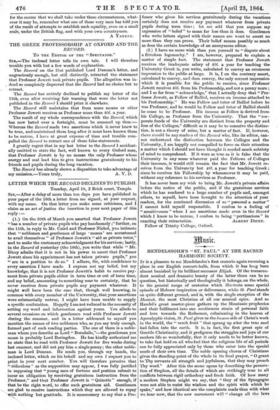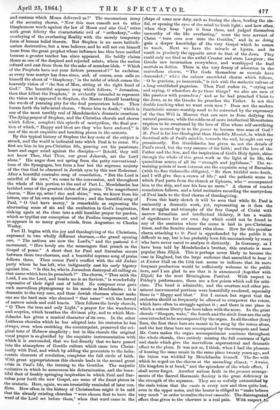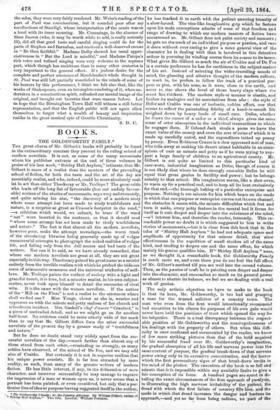MENDELSSOHN'S " ST. PAUL" AT THE SACRED HARMONIC SOCIETY.
Ir is a pleasure to see Mendelssohn's first oratorio again resuming a place in our English concert-halls, from which it has long been almost banished by its brilliant successor Elijah. Of the transcen- dent musical and dramatic beauty of the latter there can be no question, but historically and theologically it belongs, on the whole, to the general range of oratorios which illustrate some special episode of Hebrew inspiration or deliverance, while St. Paul stands on quite different ground, and is, with the single exception of the Messiah, the most Christian of all our musical epics. And as Handers great master-piece gathers up the Messianic prophecies and their fulfilment into one continuous strain of personal faith and love towards the Redeemer, culminating in the heaven of Apocalyptic vision, St. Paul gives us the human side of Christ's work in the world, the " much fruit '' that sprang up after the true seed had fallen into the earth. it is, in fact, the first great epic of Gentile Christianity, and it prefigures the struggles and joys of our modern life so wonderfully, that it only needs to be better known, to take fast hold on all who feel that the religious life of all periods can be fully appreciated only by those who enter into the special needs of their own time. The noble opening chorus of Christians gives the standing-point of the whole in its final prayer, " 0 grant to Thy servants all strength and joyfulness, that they may preach Thy word." After this the scene opens by describing•the persecu- tion of Stephen, all the details of which are strikingly true to all conflicts between rigid orthodoxy and fresh faith. Of how many a modern Stephen might we say, that " they of the Synagogue were not able to resist the wisdom and the spirit with which he spake," and how identical are the complaints made then with what we hear now, that the new movement will " change all the laws
and customs which Moses delivered us !" The unconscious irony of the accusing chorus, "Now this man ceaseth not to utter blasphemous words against the law of Moses and also God," seizes with great felicity the characteristic evil of " orthodoxy,"—the overlaying of the everlasting Reality with the merely temporary form of human belief therein. But Stephen is no mere latitudi- narian destructive, but a true believer, and he will not cut himself loose from the great prophet whose influence has thus been ossified because a greater teacher has since appeared. He boldly claims Moses as one of the despised and rejected saints, whom the nation refused and cast from them for the sake of senseless idols. " Which of the Prophets have not your fathers persecuted?" he exclaims, as every true martyr has done since, and, of course, soon calls on himself the shout of " blasphemy," in the midst of which comes the heavenly vision of " the Son of Man, sitting at the right hand of God." The beautiful soprano song which follows, " Jerusalem, thou that killest the Prophets," is evidently intended to represent the vision as it appeared to Stephen, the Master Himself breathing the words of yearning pity for the deaf persecutors below. Then bursts forth the infuriated chorus, "Stone him to death," which is one of the most terribly real of Mendelssohn's dramatic creations. The dying prayer of Stephen, and the Christian chorale and chorus which follow, complete this episode of martyrdom, the final por- tion of which, " Happy and blest are they who have endured," is one of the most exquisite and touching pieces in the oratorio.
By this typical history of Stephen the key-note of the subject is struck, and the world is indicated into which Paul is to enter. We first see him in his pre-Christian life, pouring out his passionate heart and eager mind against the disciples—" Behold, they will not know Thee, that Thou, our great Jehovah, art the Lord alone." His anger does not spring from the petty conventional- isms of the Synagogue, but from a fear lest the supreme majesty of the One God be obscured in Jewish eyes by this new Redeemer. After a beautiful contralto song of consolation, " But the Lord is mindful of his own," we come to the conversion, and throughout the whole of this portion to the end of Part I., Mendelssohn has lavished some of the greatest riches of his genius. The magnificent chorus, Rise up, arise ! rise and shine," was, we know from his letters, one of his own special favourites ; and the beautiful song of Paul, " 0 God have mercy," is remarkable as expressing the alternating sense of sin and the exultation in God's inspiration, sinking again at the close into a still humbler prayer for pardon, which so typifies our conception of the Pauline temperament, and re-appears in so many great minds, from Augustine to Charles Wesley.
Part H. begins with the joy and thanksgiving of the Christians, expressed in two wholly different choruses,—the grand opening one, " The nations are now the Lord's," and the pastoral 6-8 movement, " How lovely are the messengers that preach us the Gospel of peace." A short duet for Paul and Barnabas occurs between these two choruses, and a beautiful soprano song of praise follows them. Then comes Paul's conflict with the old Judaic party whom he has left, who indignantly past his early bigotry against him. " Is this he, who in Jerusalem destroyed all calling on that name which here he preacheth ?" The chorus, " Thus saith the Lord, I am the Lord, and beside me is no Saviour," is wonderfully expressive of their rigid cast of belief. No composer ever gave such marvellous physiognomy to his music as Mendelssohn ; it is dramatic to the very core, and these Jewish choruses almost make one see the hard men who shunned " that name" with the hatred of narrow minds and cold hearts. Then follows the lovely chorale, " 0 Thou the true and only Light," a prayer for the wanderers and sceptics, which breathes the divinest pity, and to which Men- delssohn has given a musical character of its own. In the other Lutheran chorales which he has adopted into his oratorios he has always, even when enriching the counterpoint, preserved the ori- ginal tone of Hebrew simplicity ; but in this chorale the original vocal prayer is so glorified by the exquisite instrumentation with which it is surrounded, that we feel directly that we have passed into the atmosphere of Gentile culture which came into Christ- ianity with Paul, and which by adding the geocentric to the helio- centric elements of revelation, completes the full circle of faith. With great appropriateness this chorale leads in the second great crisis in Paul's life, the turning to the Gentiles. The majestic recitative in which he announces his determination, and the beau- tiful duet of freshly springing inspiration in which Paul and Bar- nabas pour forth the new Gospel, are some of the finest pieces in the oratorio. Here, again, we are irresistibly reminded of later con- flicts. How often in the history of Christendom might it be said that the already existing churches " were chosen first to have the word of the Lord set before them," when that word came in the shape of some new duty, such as freeing the slave, healing the sin- ful, or opening the eyes of the mind to fresh light ; and how often. when they haw "put it from them, and judged themselves unworthy of the life everlasting," must the true servant of Christ " turn even now unto the Gentiles," and in so doing gain a deeper knowledge of the very Gospel which he comes to teach. Next we have the miracle at Lystra, and its result in precisely the opposite error to that of the Jews. They could only see God as the awful Creator and stern Lawgiver ; the Greeks saw incarnation everywhere, and worshipped the frail mortals as deities. There is the very frenzy of adoration in the marvellous chorus, " The Gods themselves as mortals have descended ;" while the calmer sacerdotal chorus which follows, " 0 be gracious, ye immortals," is rich with the aesthetic culture of a long-established paganism. Then Paul rushes in, " crying out and saying, 0 wherefore do ye these things? we also are men of like passions with yourselves; and as he had preached Christ to the Jews, so to the Greeks he preaches the Father. Is not this double teaching what we want even now ? Does not the modern Pantheistic nature-worship need to be corrected by the supremacy of the One Will in Heaven that can save us from deifying the natural passions, while the coldness of mere intellectual Monotheism requires to be sweetened by the love of Him whose self-sacrificing life has opened up to us the power to become true sons of God ? St. Paul is far less theological than Handel's Messiah, in which the doctrinal side of Paul's mind is, towards the end, brought out very prominently. But Al endelssohn has given us, not the details of Paul's creed, but the very essence of his faith; and the love of the Father and the Son, and the inspiration of God's Holy Spirit, shine through the whole of this great work as the light of its life, the quenchless source of all its "strength and joyfulness." The re- maining points of most interest are the exquisite song of Barnabas (with its fine violoncello obligato), " Be thou faithful unto death, and I will give thee a crown of life ;" and the pathetic scene in which Paul parts from the church at Ephesus, who " accompanied him to the ship, and saw his face no more." A chorus of tender consolation follows, and a brief recitative recording the martyrdom of Paul leads to the final chorus of thanksgiving.
From this hasty sketch it will be seen that while St. Paul is eminently a dramatic work, yet, representing as it does the first struggles and triumphs of the free Gospel of Christ with narrow formalism and intellectual idolatry, it has a wealth of significance' for our own day which could not be found in any of the oratorios where the scene is laid in pre-Christian times, and the Semitic element rules alone. How far this peculiar charm attaching to St. Paul is apprehended by the public it is difficult to say, but it has probably been felt unconsciously by many who have never cared to analyze it distinctly. In Germany, as I have been told by Mendelssohn's brother, this oratorio is more popular than Elijah. This is perhaps never likely to become the case in England, but the large audience that assembled to hear it at Exeter Hall on the 15th inst. seems to indicate that its more frequent production would be sufficiently welcome to the public here, and I am glad to see that it is announced (together with Elijah) for the next Birmingham Festival. With respect to Friday's performance, there are a few points which call for criti- cism. The band is admirable, and the overture and other pro- minent instrumental portions were beautifully rendered, especially those in " Happy and blest." But I cannot but regret that the orchestra should so frequently be allowed to overpower the voices, which have often to struggle against it ; and there is one place in which a serious liberty has been taken with the score. In the great chorale " Sleepers, wake," the fourth and the sixth lines are the only ones intended to be accompanied by the organ. In all theother (four) lines, the first three bars are meant to be sung by the voices alone, and the last three bars are accompanied by the trumpets and band Mr. Costa makes the organ accompaniment continue throughout the whole chorale, thus entirely missing the full contrasts of light and shade which give the marvellous supernatural and dramatic effect to the piece. It was not so, I think, when I had the pleasure of hearing the same music in the same place twenty years ago, and the baton was wielded by Mendelssohn himself. The fire with which he urged on the chorus at the ascending climax, " Awake, His kingdom is at hand," and the splendour of the whole effect, I shall never forget. Another serious fault in the present arrange- ments of the Sacred Harmonic Society is the great deficiency in the strength of the sopranos. They are so wofully outmatched by the male voices that the canto is every now and then quite lost, even in the upper notes, and the hearer is obliged to "make believe very much " in order to realize the tout ensemble. The disintegrated effect thus given to the choruses is a real pain. With respect
the solos, they were very fairly rendered. Mr. Weiss's reading of the part of Paul was conscientious, but it sounded poor after my recollections of Staudigi, whose interpretation of the music was on a level with its inner meaning. Mr. Cummings, in the absence of Sims Reeves (who, it may be worth while to add, is really seriously ill), did all that good taste and careful singing could do for the parts of Stephen and Barnabas, and received a well-deserved encore in " Be thou faithful." Madame Dolby showed her usual appre- ciativeness in " But the Lord is mindful," and Madame Parepa's rich voice and refined singing were very welcome in the soprano part, which though less ambitious than in many other oratorios is very important to the general effect. If a jealous desire for the complete and perfect utterance of Mendelssohn's whole thought in St. Paul was still left partially unsatisfied in the minds of some of his hearers by this performance, I think we felt also that, like the works of Shakespeare, even an incomplete rendering of it, when un- dertaken in a conscientious spirit, refreshed our mental image of the original, and brought out beauties that were unseen before. Let us hope that the Birmingham Town Hall will witness a still better representation, and that the English public will not again allow themselves to forget what a wealth of beauty and inspiration resides in the great musical epic of Gentile Christianity.
S. D. C.
































 Previous page
Previous page